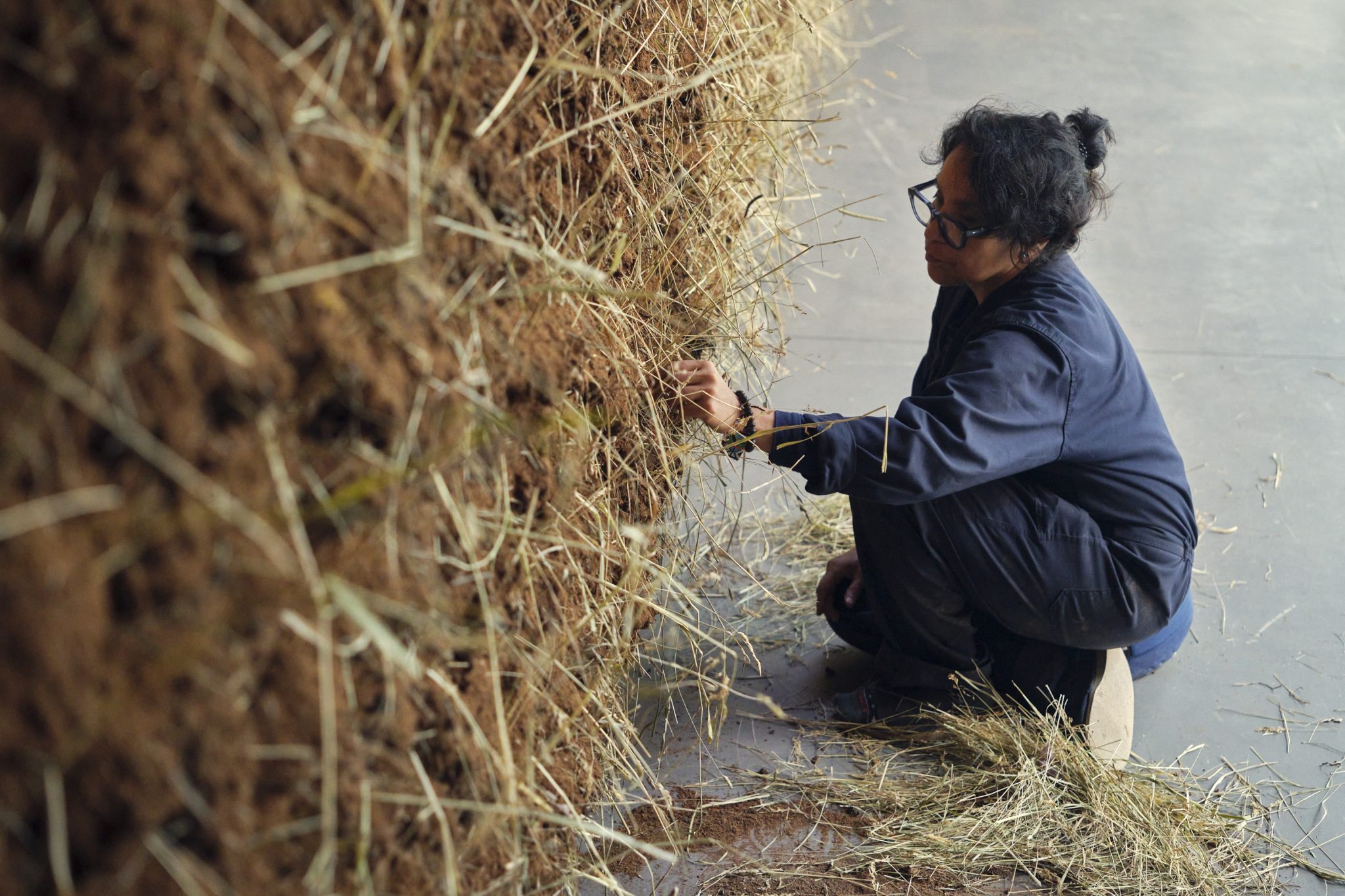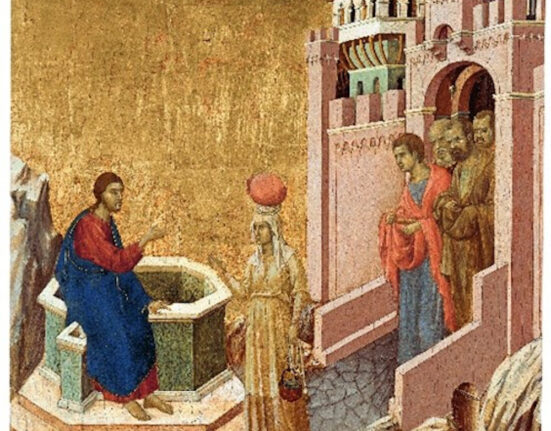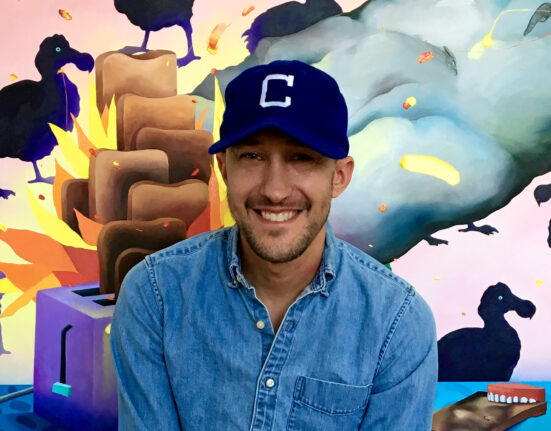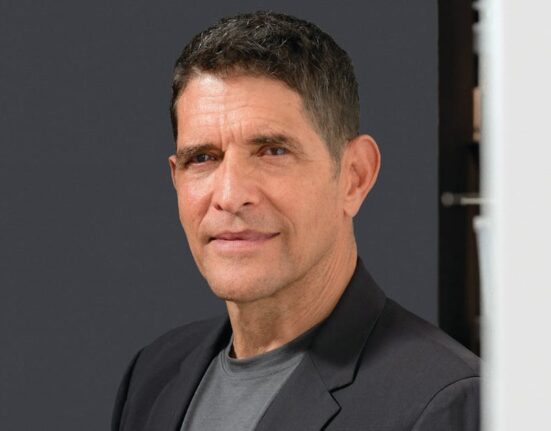Encountering Earthly Paradise, Colombian sculptor Delcy Morelos’s fragrant dirt wall sculptures at the 2022 Venice Biennale, was an indisputable highlight of the international exhibition. Navigating the maze-like installation encouraged viewers to appreciate and engage with the earth—blended with hay, cassava flour, cacao powder, cloves, and cinnamon—in an entirely unexpected way, elevating the humble soil to the realm of fine art.
“The soil as a sacred element has been forgotten by contemporary civilization,” Morelos told me, speaking through a translator. “I like to show the earth/soil in a way that is has not been seen, so it appears very delicate, soft, and that it smells delicious. I make beautiful sculptures so that the earth/soil can be seen as beautiful.”
Though the biennale was something of a breakthrough moment for Morelos on the art-world stage, work was already well underway on her first U.S. solo show, which opened last month at the Dia Art Foundation in Chelsea.
“This has been one of the most complex projects that I have done,” Morelos said of the exhibition, which features two monumental new installations, Cielo terrenal (Earthly Heaven) and El abrazo (The Embrace). “We spent four years finding a way to make it happen.”
Delcy Morelos, Earthly Paradise (2022) at the Venice Biennale international exhibition, “The Milk of Dreams.” Photo: Ben Davis.
Both pieces continue to explore our relationship to the earth, and Morelos’s desire to make it more sustainable, in keeping with her indigenous heritage, descended from the Emberá, the indigenous people of Panama and Colombia, on her grandmother’s side.
“Those who are making use of the land are not operating from a space of care and respect towards Mother Earth. The people who do are the ancestral cultures, for example in the Amazonian jungle, because they maintain thousand of years of traditions, caring for the jungle and the soil,” she said. “But it is not easy because people are always thinking about making money not protecting the earth. They don’t realize that when they destroy the land, they are destroying themselves, because we nourish ourselves from the earth, and we will return to the earth when we die.”
The show at Dia came about after a group trip that the foundation arranged to Colombia in 2019, on the occasion of Dan Flavin’s first show in the nation, at the Museo del Moderno de Medellin. Flavin, of course, is one of the artists at the core of Dia’s collection, which is focused on Minimalism and Land Art. But in recent years, the foundation has worked hard to expand its purview beyond the white male artists traditionally associated with those movements.
Colombia “was a learning trip,” said exhibition curator Alexis Lowry, who recently started a new job as curatorial director at Hauser and Wirth. “We visited Delcy’s studio and Jessica [Morgan, the director of Dia] and I walked out and immediately said ‘Well, that’s a show.’”
Delcy Morelos, Cielo terrenal (Earthly Heaven), 2023, at Dia Chelsea, New York (detail). Photo by Don Stahl, ©Delcy Morelos.
Visitors to the exhibition are first greeted by Cielo terrenal, in which Morelos has painted the floors and lower third of the gallery walls—up to the level of flooding caused by Hurricane Sandy in 2012—with a thin layer of water and acrylic binder mixed with soil sourced from Goshen, New York.
“Goshen is part of what’s known as the Black Dirt Region in the Hudson Valley. It’s incredibly rich in nutrients and some of the most fertile soil in the country,” Lowry said.
Morelos also used the soil mixture to coat various pieces of wood and lumber sourced from dumpsters at Dia’s outpost in Beacon, New York—remnants of construction projects from past exhibitions laid out in neatly stacked piles on the floor. The effect is a stark, monochromatic black.
“Delcy is really breathing new life into this material,” Lowry added. “She’s always done these earth-lined rooms with a consideration of life cycles and the idea that death fertilizes life—what is beneath the ground is composed of decay, but also constitutes growth.”
Delcy Morelos, El abrazo (The Embrace), 2023, at Dia Chelsea, New York (detail). Photo: Don Stahl, ©Delcy Morelos.
“The earth is expressed as the transforming matter of life in death and death in life,” Morelos agreed. She also wanted to incorporate earth from her native country, but import/export laws prevented her from shipping soil across international borders. Instead, the Dia fragments are paired with ceramics she made in Colombia from local black earth.
“They were made using this ancestral technique where you fire the clay over an open flame, so it both literally colors the ceramic, but also that color is then augmented naturally, with vegetal pigments,” Lowrey said.
“These elements are more organic, and they are remnants that are found in the jungle,” Morelos added. “It turns out that these elements that can be seeds, shells, and tree trunks that will nourish the plants that will be born in the future. There is a difference in form, but just the same, the elements from Dia can nourish the plants of the future.”
Less than two weeks after the artist’s New York debut, Morelos also opened her first solo show in France at Marian Goodman in Paris, where she just joined the roster. It is also the first time the 56-year-old artist has had formal gallery representation, despite having appeared in numerous biennials and institutional exhibitions.
There, Morelos created another site-specific installation for the gallery’s lower level, again painting part of the floor and walls with soil. But the exhibition also includes more market-friendly pieces, including hanging textiles and works on paper made over the past 20 years.
Installation view of “Delcy Morelos: El oscuro de abajo” at Galerie Marian Goodman, Paris. Photo: courtesy of Marian Goodman.
These earlier works showcase Morelos’s first forays into natural materials, such as red pigments and jute fiber. A reverence for the earth and the cycle of life is the through line across her practice.
“I am a witch—a witch is a woman of wisdom who learns from nature and its secrets,” Morelos said. “I come from a lineage of ancestral knowledge, and I understand that the soil is nourishment.”
At Dia, the second gallery is the show’s titular work, El abrazo, is a towering mound of earth liberally studded with individually placed stems of Hudson Valley hay. Lowry helped with the nearly two-month-long install process, and was chastised by the artist for attempting to insert multiple pieces at a time. “Delcy is the most detail-oriented artist you could possibly imagine,” the curator said.
Delcy Morelos installing El abrazo (The Embrace), 2023, at Dia Chelsea, New York. Photo by Don Stahl, ©Delcy Morelos.
Made from top soil recycled from a Manhattan roof garden, mixed with clay, an organic landscaping compound used to keep grass seed in place, and ground coconut husks, the piece is designed to be touched. Morelos found people were inevitably drawn to the earth at the Venice Biennale, and decided to embrace that impulse. She hopes this creates a sense of intimacy in the work, reminding the viewer of our ties to the earth.
In El abrazo, “the earth is a mountain that embraces you, because I think that people feel very alone living in the city and sometimes they need a hug,” Morelos said.
But the installation also appears to float above the gallery floor, its heavy mass improbably levitating in space in something of an engineering miracle.
“Because the earth is something that we always walk on, I wanted to elevate it,” the artist added, noting that the large scale is also meant to dwarf the viewer.
Both Dia installations take up the entirety of a dimly lit gallery. The aroma of Morelos’s earthen creations, which incorporate spices such as cinnamon and clove, hit your nose before your eyes adjust to the light, which is filtered through scrims installed on the skylights. (The artist recommends return visits with the changing seasons, to encounter the works under different lighting conditions.)
Delcy Morelos, El abrazo (The Embrace), 2023, at Dia Chelsea, New York (detail). Photo by Don Stahl, ©Delcy Morelos.
Olfactory elements have been a key part of her practice for least a dozen years, after Morelos was inspired to try and use soil to make cookies that recalled the scent of maternal milk, mixing in cacao butter, brown sugar, beeswax, cinnamon, and cloves. Over the years, she’s refined that process to give her more control over the organic elements, to prevent fermentation, mold, or fungus.
For Morelos, it’s important that her work activates the “senses that we have forgotten, such as the sense of touch and smell—too much importance is given to vision” she said. “The sense of smell activates our memories, and the memory will take you to those happy moments where you once were in the forest.”
But the artist is also looking to the future, with a career survey set to open at the Pulitzer Arts Foundation in St. Louis in March. It will feature work from the 1990s through to today, including a site-specific monumental earth work.
“The sculpture at the Pulitzer is about the obsession of being owners of the land. People put up nets, fences, and railings to delineate and separate land, saying this is ‘mine’ and that is ‘not mine,’” Morelos said. “But it is absurd to think that we can be owners of the earth. We form part of the earth and we are united with her—we are not her proprietors.”
Quotes from Morelos were translated by Amparo Vollert.
“Delcy Morelos: El abrazo” is on view at Dia Chelsea, 537 West 22nd Street, New York, New York, October 5, 2023—July 2024.
“Delcy Morelos: El oscuro de abajo” is on view at Galerie Marian Goodman, 79 and 66 Rue du Temple, 75003 Paris, October 14–December 21, 2023.
“Delcy Morelos: Interwoven” will be on view at the Pulitzer Arts Foundation, 3716 Washington Boulevard, St. Louis, Missouri, March 8–August 4, 2024.
More Trending Stories:
Revealed: The Major Mystery Consignors of New York’s Multi-Billion-Dollar Fall Auction Season
Christie’s Pulled Two Works by a Prominent Middle Eastern Artist From Sale After a Complaint
Follow Artnet News on Facebook:
Want to stay ahead of the art world? Subscribe to our newsletter to get the breaking news, eye-opening interviews, and incisive critical takes that drive the conversation forward.







